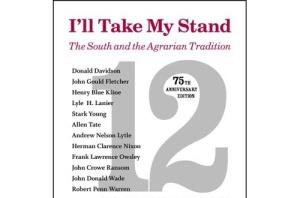I’ll Take My Stand: The South and the Agrarian Tradition is a collection of twelve pieces (ten essays and two short stories) that was published in 1930 and has much to say to us today. The book has retained a certain fame; I have heard of it for years, but only very recently came to read it.
Its twelve authors were novelists, poets, dramatists, and teachers mostly, and Southerners all. And indeed one of the reasons I read it was because of the stature of some of them: John Crowe Ransom, Robert Penn Warren, Donald Davidson, Allen Tate.
This collection can fairly be seen as the last intellectual gasp in defense of a society-wide agrarian and localist way of life, what Ransom calls “antique conservatism.” There are, of course, some people still attracted by its lure today, and some who even live it out, the Amish most notably. But whereas in 1930 some serious people thought a fight to preserve that way of life (and not only in the South) might be successful, I suppose it would be difficult to find anyone today who thinks such a way of life, barring some ecological disaster, will ever be more than a marginal phenomenon in the United States and the West in general. In other words, today’s agrarians lack the hope of the twelve contributors to I’ll Take My Stand.
What the twelve Southerners objected to was the domination in culture, politics, and economics of an aimless, frenetic life of production and consumption. They regarded this as interfering with the free and full flowering of a humanly dignified and happy life. They thought the solution had to be in a contrary worldview rooted in the way people actually lived their lives.
Hence two of the essays criticize the New Humanist movement of the conservative author Irving Babbitt (with which the twelve Southerners shared certain attitudes) because it did not advocate for the agrarian economic base the twelve southerners thought necessary for a healthy human life. The book robustly argues for an agrarian way of life in which agriculture and its mode dominate society. They argue neither a mere set of refined philosophical abstractions nor encouraging individuals to withdraw from a highly vulgarized civilization is much of a solution at all. I was struck by their argument being cultural as well as economic. They thought industrialism even corrupted human leisure, for example.
Although race is not central to their arguments, it cannot be ignored, if only because some of the writers do not ignore it. I do not think any of them handle the issue in what I would consider a completely enlightened way. For example, history professor Frank Lawrence Owsley, in his essay, tries to minimize the South’s culpability for slavery.
So, is there any reason to read these essays today, essays for a cause about as lost as one can be? I think so. It is sometimes good to get a view from another culture, in order to put one’s own in perspective. This does not mean one ought necessarily agree with everything the book argues for (even leaving the race question aside), but the book does intelligently raise legitimate questions about the modern industrial society that deserve a hearing.


